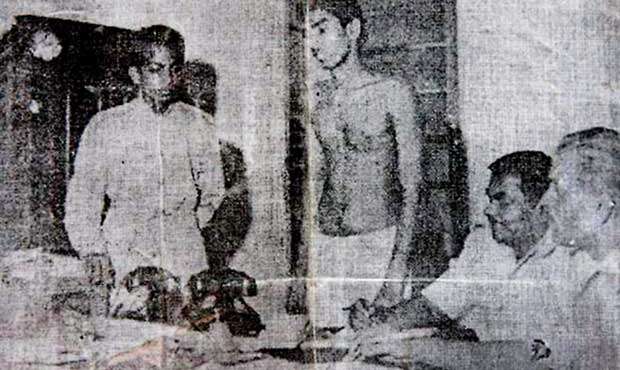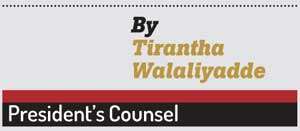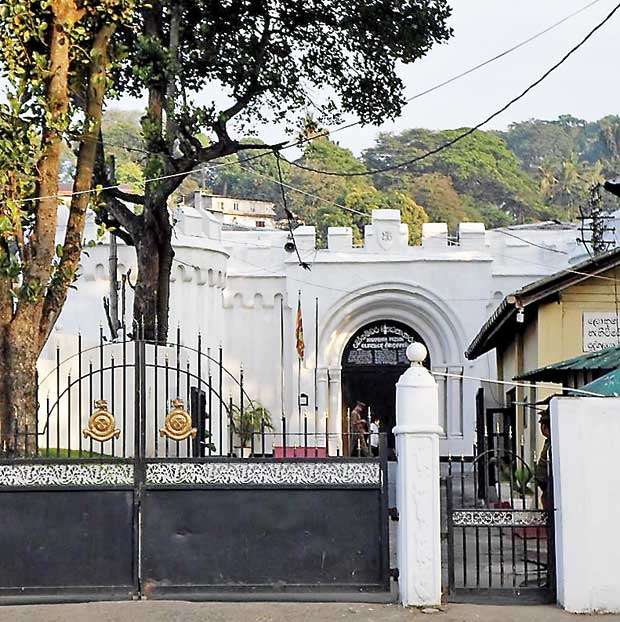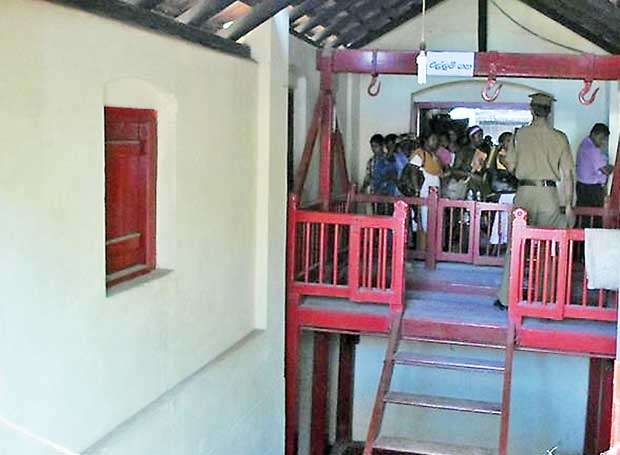01 Aug 2018 - {{hitsCtrl.values.hits}}

“Only one of them had a swinging time” (‘Edge’)
For the layman, the death sentence has been provided in the Penal Code from time of its inception in 1883. Once the death sentence is pronounced by the High Court of the Republic, the Attorney General and the High Court Judge, who pronounced the sentence, must forward their recommendations to the Minister of Justice  regarding whether the sentence should be carried out. Upon receipt of the recommendations the Justice Minister will send his own recommendation to His Excellency the President. Upon receipt by him of the recommendations the President exercises his discretion as to whether the sentence should be carried out or whether to commute it to life imprisonment. If the President directs that the sentence should be carried out then the prisoner would be executed at a place, date, and time as nominated by the President. The execution is carried out by hanging the prisoner by the neck “until he shall be dead”.
regarding whether the sentence should be carried out. Upon receipt of the recommendations the Justice Minister will send his own recommendation to His Excellency the President. Upon receipt by him of the recommendations the President exercises his discretion as to whether the sentence should be carried out or whether to commute it to life imprisonment. If the President directs that the sentence should be carried out then the prisoner would be executed at a place, date, and time as nominated by the President. The execution is carried out by hanging the prisoner by the neck “until he shall be dead”.
The conviction and sentence are subject to two appeals- one to the Court of Appeal and the other to the Supreme Court. A death sentence case is always re-scrutinized by the Court of Appeal even where the prisoner doesn’t appeal from the High Court. The High Court will not entertain a plea of guilty in a death sentence case and if the accused pleads guilty, the High Court will record a plea of “not guilty” and proceed to full trial.

Pronouncement of the death sentence
Before the sentence is passed, the judge addresses the accused and invites him to say anything as to why the death sentence should not be passed on him, and informs him that what he says will be recorded and forwarded to the President. This is called the ‘allocutus’.
Then all the windows and doors are closed, the fans and lights are switched off, the remand guards take their stand on either side of the dock which holds the accused, and the Court Crier cries out- “All stand! Silence while the High Court of the Republic pronounces the sentence of death!” All those in the well of the Court must rise, except the Judge; these days one often sees the Judge himself standing up when delivering the judgment. But this is not necessary.
The execution
The executioner is a Government salaried employee. On the day of the execution the prisoner may order anything he wishes to eat and it is delivered to him in the final cell prior to being taken to the Death Cell. He is allowed visitation by his near and dear. Christians are given absolution by a priest if so requested and the Buddhists may have a monk in attendance. So also the Muslims and various other denominations, may request their respective religious representatives for their final prayers. Thereafter he is taken manacled and chained and escorted to the death Cell with the Superintendent of Prisons in attendance.
The execution is carried out by standing the prisoner on a trapdoor in the death cell with his hands and legs secured and then asked for his last words if any. Then he is blind folded and a lever pulled by the executioner at precisely the given time, which opens the trapdoor and the prisoner falls a distance of about six feet. The knot of the noose is placed at a precise angle on the back of the neck on the spinal column so that the neck snaps due to the impact of the fall. Selected observers, including close relatives, are permitted to be present at the execution.
On the day of execution all the other prisoners and remandees are locked up and the gate of the prison kept open, so that the carrier of a last minute reprieve by the President can be rushed into the death cell without time consuming formalities even as the execution preliminaries are in progress. In Sri Lanka, the last death sentence was carried out on Siripala alias ‘Maru Sira’ way back in the seventies. It is said that the death sentence thereafter was stopped due to various unpalatable stories that started circulating regarding the manner in which he was executed.

The law
As the law stands at present, those found guilty of murder “shall be sentenced to death” and in the context of the subject matter dealt with herein, those found guilty of drug trafficking are “liable to be sentenced to death or to life imprisonment”.
The lobbies
Much has been published in the newspapers and broadcast through the media regarding the pros and cons of implementing the death sentence. Much has been written about the lacuna in the law and violation of international treaties and covenants to which Sri Lanka is a party.
The arguments of the anti-death sentence lobbyists, which include civil rights movements, political parties, some religious leaders, and idle philosophers can be categorized in summary as follows:
That judicial execution conflicts with of international norms and treaties and Charters to which Sri Lanka has subscribed; that it is not a deterrent; that innocent men might be executed; that the main perpetrators are immune to prosecution whilst their underlings are condemned and executed; that in drug related crime, the drug lords operate freely whilst their underlings and other small time operators are prosecuted, and that corruption in the law enforcement and political influence often contribute to the commission of these crimes either as facilitators or as protectors.
It appears that this sense of outrage is not quite universal. One finds academicians, religious leaders and quite a majority of Members of Parliament, advocating the reactivation of the death sentence.
"On the day of execution all the other prisoners and remandees are locked up and the gate of the prison kept open, so that the carrier of a last minute reprieve by the President can be rushed into the death cell without time consuming formalities"
The lobby which stresses that the reactivation of the death sentence will have severe economic repercussions on Sri Lanka from the International Community and also violate the various treaties entered into by Sri Lanka. Where the question of deterrent is concerned, the statistics of foreign countries are not yardsticks to measure the deterrent suitable in Sri Lanka. Those averse to the death sentence claim that the root cause seems to be corruption in high places.
Proposed Amendments to the law
The country’s whole judicial system as well as in other democratic systems, rests on reasonableness and probabilities. There are no absolutes in anything. This is basically what is called ‘chaos theory- where the probable present can predict a probable future, but not the absolute. Hence, the community works on probabilities and not on absolutes. Even the communist, socialist, and democratic systems misfired because in human conduct there is no guarantee that the equation 2+2=4 always holds true. So, governments, communities, nations, states exist on probabilities- so also then, does justice. For that matter, when one crosses the high way, there is no absolute that he will reach the other side.
Having said this, to satisfy all (in all probability), I would suggest a framework of amendments to the criminal law for the consideration of the law makers and the general public:
28 Oct 2024 1 hours ago
28 Oct 2024 2 hours ago
28 Oct 2024 5 hours ago